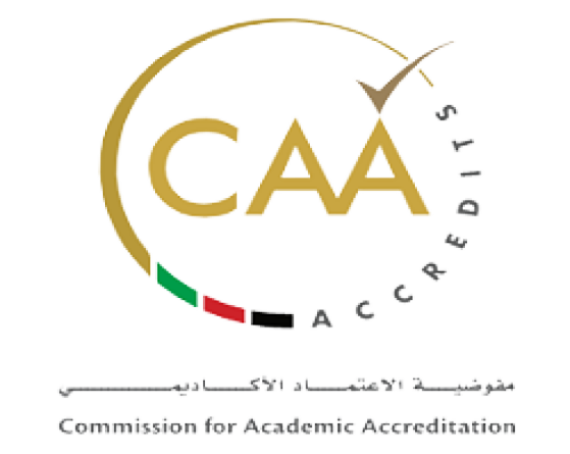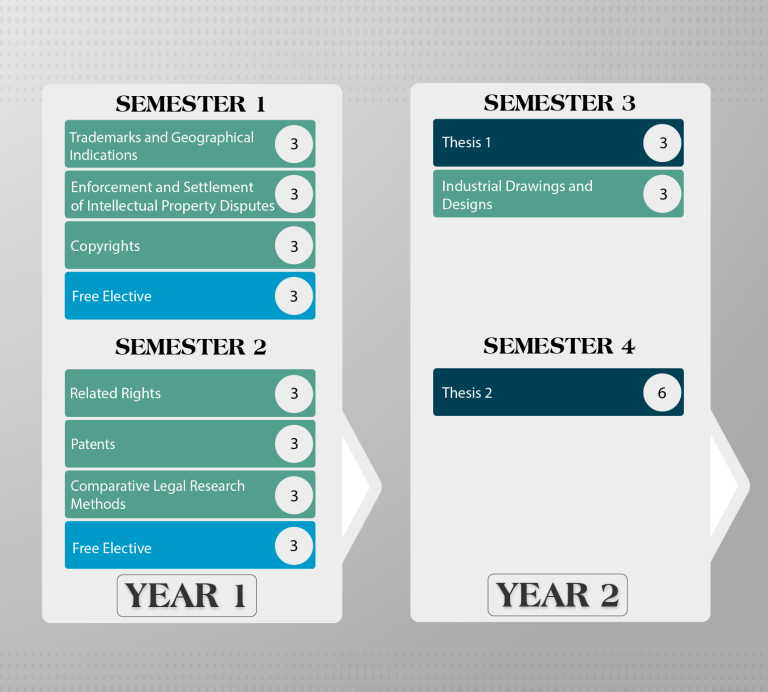Master in Intellectual Property
This is a qualitative program in the College of Law and accepts graduates from outside the legal field. As the realm of Intellectual Property is pertinent to industrial and commercial sectors of all kinds, this specialization features a relatively diverse breadth of students.
This program qualifies graduates to work in the following fields/careers:
- Commercial and Industrial Corporations
- Legal Practice
- Government Economic Administrations
- Customs Authorities
- Corporate Legal Advisory
Program Goals
- Meeting needs of the local and regional market from experts and specialists in the various fields of intellectual property.
- Developing scientific research in the field of intellectual property in accordance with the legal rules valid in UAE through supporting Master’s theses, and emphasizing on comparative analytical studies.
- Establishing a legal center specialized in Gulf legal studies in the field of intellectual property to contribute to preparation of Master’s students in this field.
- Supporting the protection of intellectual property and making the academic program as the axis of the intellectual property development in the UAE and GCC countries through providing consultations, holding academic and occupational conferences for the stakeholders within the social service framework.
- Explain the knowledge in the field of intellectual property in an in-depth and comprehensive manner.
- Analyze the contemporary knowledge of scientific research to be a basis for constructive critical thinking and familiarity with the latest developments in intellectual property, professional practice and knowledge production to find new concepts and solutions to emerging challenges
- Prepare scientific research in the field of intellectual property in line with legal research methods and the requirements of scientific integrity
- Present the ability to carry out legal duties objectively, impartially, and independently through interactive and self-learning applications
- Create legal solutions in cases and modern methods in order to take appropriate measures and decisions in accordance with the texts, rulings and judicial principles.
ADMISSION REQUIREMENTS
GRADUATION REQUIREMENTS
For graduate degree completion, graduate students must satisfy the following requirements:
- Earn a minimum CGPA of 3.00 on a scale of 4.00.
- Successfully complete all courses as described in the study plan.
- The Degree Completion requirements must be met within the timeframe of the program.
- Successfully complete the “Thesis” course.
ACCREDITATION
PROGRAM STRUCTURE
Course Category
Total Number of Courses
Total Number of Credit Hours
Bridging Courses
9
22
Core Courses
7
21
Free Electives
2
6
Thesis 1
1
3
Thesis 2
1
6
Total (Excluding Bridging Courses)
36 Credit Hours
PROGRAM courses
BRIDGING COURSES
9 COURSES | 22 CREDIT HOURS
This
course covers a detailed and analytical study of the general theory of crime,
including its definition, types, and study of its two aspects (physical and
moral), as well as an explanation of the criminal law’s applicability in terms
of time, place, persons, and the declaration of criminal involvement and its
provisions, barriers to criminal responsibility, and justifications for its
legality.
This course covers the definition of commercial law, its history and sources, the study of commercial business theory, the study of merchants, including the definition of the merchant, as well as the obligations of merchants “registration in the commercial registry, keeping commercial books”. Also, the study of commercial contracts, commercial mortgage, agency commission and brokerage generally, and legal protection for shops.
This
course covers the definition of the Code of Civil Procedure, and the study of
the judicial organization in terms of the formation of courts, degrees of
litigation, judges and their assistants, rules of jurisdiction, case theory, types
of judgments, and appeals against them.
This
course includes a study of the international foreign private relationships, the
issue of legal and international jurisdiction conflicts, the adaptation of
disputes, and methods for resolving them using the Federal Civil Transactions
Law’s attribution principles. The course also covers determining the boundaries
of international jurisdiction for federal courts.
CORE COURSES
7 COURSES | 21 CREDIT HOURS
The second part of the curriculum includes a detailed and in-depth study of one of the topics of the first part, such as the international registration of trademarks, licensing for utilization of trademarks, geographical indications registration methods, international conventions related to trade names and trademarks. It also includes presentation and analysis of samples of decisions by national and international courts regarding trademarks and trade secrets.
The curriculum also provides experiences of some countries in this field and the results they have achieved, as well as several topics including international standards for the implementation and enforcement of intellectual property rights, practices in national jurisdictions, international litigation and arbitration procedures for trademarks, copyrights, patents, civil procedures in national laws and international agreements, border procedures, penal procedures in national laws and international agreements, and applicable law on copyright and related rights, computer software, and conflict of laws in the field of international publishing contracts for literary and artistic works and other works.
The curriculum of this course enables the students to understand the definition of copyrights, the conditions for granting legal protection of author right, works covered by copyright and the duration of their protection, moral and economic rights to the author of work, international agreements such as the Berne Convention for the Protection of Literary and Artistic Works, and the WIPO’s role in this field.
The course also includes a detailed and analytical study of several topics including exceptions to copyrights, licensing the use of copyright in the digital environment and how to protect it from hacking and what has been settled by the local and international judiciary in this field. The curse also enables the students to understand the collective management of rights and what has settled in WIPO and international agreements for copyright protection in the digital environment
The curriculum of this course introduces the students to the definition of related rights, their types, the duration of their protection and the relevant international agreements such as the WIPO Performances and Phonograms Treaty (WPPT), the international organizations concerned with them, and the role played by the World Intellectual Property Organization (WIPO) in this field.
The curriculum also covers a detailed and analytical study of some topics, including exceptions to related rights, licensing in the digital environment, protection of related rights in the digital environment and methods of protection such as civil protection of related rights, compensation lawsuit and procedures, methods of compensation and penal protection for neighboring rights, infringement of rights holders, established penalties and international treaties on the protection of neighboring rights holders and the Rome Convention for the Protection of Performers, Producers of Phonograms and Broadcasting Organizations (1961).
The curriculum of this course introduces the students to the concept of patent protection and its legal framework. It also enables the students to distinguish between patents and industrial drawings and designs, trademarks, copyrights, trade names, commercial address, commercial statement and the role that patents play in protecting the rights of inventors.
The curriculum also provides experiences of some countries in this field and the results they have achieved, as well as several topics including procedures for applying for a patent, the implications of granting a patent, the compulsory license to exploit the patent, and the international agreements in this regard.
The curriculum of this course introduces the students to the concept of the industrial drawings and designs protection, as well as its legal framework, importance and the role it plays in safeguarding the rights of creators. It also enables the students to distinguish between industrial drawings and designs and patents, trademarks, copyrights, trade names, commercial address, commercial statement and civil and penal protection for industrial drawings and designs.
The curriculum also provides experiences of some countries in this field and the results they have achieved, as well as several topics including Rights granted to owners of industrial designs and designs, international protection for industrial designs and designs, and international treaties on industrial designs and designs such as the Paris Convention for the Protection of Industrial Property (1883) and the Hague Agreement Concerning the International Registration of Industrial Designs (1925).
The course introduces the students to the principles and methods of legal research, as well as the meaning and types of legal research. The students will also learn scientific tools used to collect data, fundamental principles of legal writing, rules of comparison between the current legal systems (Islamic law, Latin system and Anglo-American system), ethics of scientific research and oral expression skills related to the research presentation and findings.
The students are assigned to prepare legal research using the approved research methods, and then present it orally to his colleagues
ELECTIVE COURSES
2 COURSES | 6 CREDIT HOURS
The curriculum of this course introduces the students to the protection of intellectual property in the digital environment, as well as its legal framework, importance and the role it plays in safeguarding digital copyrights. The course also helps the students understand concept of digital works, their characteristics – conditions of their protection, works covered by protection in the digital environment.
The curriculum also provides experiences of some countries in this field and the results they have achieved, in addition to a detailed and in-depth study in several topics including digital works and methods to protect them legally and technologically, the most prominent international bodies working in the protection of copyright and related rights in the digital environment, the role of international agreements in the protection of digital works -Berne Convention for the Protection of Literary and Artistic Works and TRIPS Agreement- and technological measures to protect digital works.
The curriculum of this course introduces the students to the intellectual property rights in the medical and pharmaceutical fields, their importance and the role they play in safeguarding the rights of inventors.
The curriculum also provides experiences of some countries in this field and the results they have achieved, as well as a detailed and in-depth study in several topics including the emergence of patents and trademarks in the pharmaceutical sector, the legal regulation of the licensing contract for the exploitation of patents, data protection, recent developments in international privacy regulation, personal data or anonymous information, transfer or sale of personal data, liabilities and compensation, regulatory limitations, quality assurance restrictions necessary for medical product development and drug manufacturing, clinical investigations, the United States Food and Drug Administration, European Medicines Agency and UAE Ministry of Health and Prevention.
The curriculum of this course enables the students to understand the definition of economic development, as well as its legal framework, importance and the role it plays in safeguarding property rights.
The curriculum also provides experiences of some countries in this field and the results they have achieved, in addition to a detailed and in-depth study in several topics including unfair competition, legal regulation in national legislation, international agreements, Intellectual property agreements in force in the context of economic development, intellectual property and theories of justice, examples of the negative economic effects of infringements of intellectual property rights and unfair competition
The curriculum of this course introduces the students to the concept of plant variety protection, as well as its legal framework, importance and the role it plays in safeguarding farmers’ rights and benefit-sharing,
Also, the curriculum covers a detailed and in-depth study several topics including the mechanism of work of the entities responsible for the protection of plant varieties, the role of the International Union for the Protection of New Varieties of Plants (UPOV), procedures for registering new plant varieties, the effect of registration, duration of protection and identifying technical aspects including Distinctness, Uniformity and Stability (DUS) Testing, UPOV Guidelines, field testing, biochemical and molecular techniques statistics, data analysis, reporting and exploitation of plant breeders’ rights, breeders’ rights versus farmers’ rights, researcher rights, farmers’ rights and communities’ rights.The curriculum also provides experiences of some countries in this field and the results they have achieved, in addition to a detailed and in-depth study in several topics including legal means to protect trade secrets in UAE legislation such as civil protection and penal protection resulting from the protection of trade secrets, precautionary measures, compensation for damages, penalties.
THESIS
2 COURSES | 9 CREDIT HOURS
Students in this course will work with their thesis supervisor to develop a thesis proposal and begin their distinctive, applied research project. The primary goal is for the student to practice the mechanisms of transitioning from concept to active inquiry. Depending on the nature of the topic, the student will develop a study questions, conduct a literature review, develop a methodological approach, and begin preliminary research. Students are expected to apply qualitative, quantitative, and comparative research approaches to the chosen topic.
In this course, students will continue developing their thesis project, revising techniques (if required), addressing challenges, analyzing findings, and eventually articulating the complete experience. Students will build on work from the previous semester and put all of the pieces together to complete the final thesis project, following the required research process and procedures. Students will be required to provide a verbal defense as part of the assessment and fulfilment of the course.
Program Director

Prof. Qusay Al Falahi
Professor / Program Director of Master in Arbitration/ Acting Program Director of Master in Intellectual Property
ATTENDANCE
WEEKEND CLASSES
Sat – Sun | BETWEEN 2:00 PM – 5:00 PM
Weekday Classes
MON – WED | BETWEEN 5:00 PM – 8:00 PM



